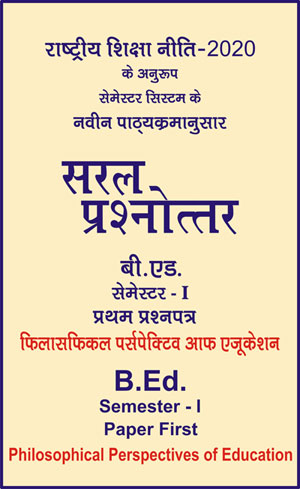|
बी एड - एम एड >> बी.एड. सेमेस्टर-1 प्रश्नपत्र-I - फिलासफिकल पर्सपेक्टिव आफ एजुकेशन बी.एड. सेमेस्टर-1 प्रश्नपत्र-I - फिलासफिकल पर्सपेक्टिव आफ एजुकेशनसरल प्रश्नोत्तर समूह
|
5 पाठक हैं |
|||||||
बी.एड. सेमेस्टर-1 प्रश्नपत्र-I - फिलासफिकल पर्सपेक्टिव आफ एजुकेशन (अंग्रेजी भाषा में)
Question- How can philosophy help us in understanding education in India?
Answer -
It is clear from the study of the following points:
(i) Transitional Nature of Indian Society : Our thesis is that Indian society is involved in a great transition in which our whole way of life is being transformed. The common core of ideas and beliefs that once represented cultural solidarity is dissolving. We can no longer perceive clearly what is constant and what is open to choice. This educational confusion and conflict cannot be understood, nor can a way out of it be found until we learn about the underlying conditions that generate it.
Education is always a function of total social pattern, and there is no point in examining philosophies of education as if they existed in isolation, independent of any social context.The Indian tradition in education has developed over a period of thousands of years. The tradition is not static and has changed in response to social conditions and political exigencies. This process of change, however, has generally been slow.
(ii) Western Culture and Indian Education : The purposes the Indian school has generally served during the last three centuries are those of transmitting the essentials of western culture. Attempts at the same time have been made to preserve the essentials of ancient Indian traditions. The conception of purposes is reflected in the way in which schools are organized, the kind of curricular established and the teaching methods employed.
(iii) Factors Affecting Education after Independence : Other ways of conceiving the aims and means of education are those of democratisation, secularism and socialism which have gained prominence after independence. Each of these is in its own way, a protest against not only the existing set of the educational arrangements but also the kind of society that perpetuates these arrangements.
(iv) Conservative Tradition : The first great tradition in Indian Society is conservatism. The conservative links ethics and morality closely to religion. To the conservative, education, when it is conceived as intellectual and moral discipline and when it is dedicated to preserving and transmitting the essential core of tradition, has an important role to play. The conservative would like us to understand that the purpose of education is to preserve and transmit.
(v) Effect of Nationalism in Indian Education : Nationalism, the principle that the primary allegiance of men belongs to the national level is the most political force in the world today. By and large the doctrine of nationalism conceives an important responsibility of school to foster patriotism. There is active support, for example, to the teaching in the schools about the United Nations, the study of material supplied by UNESCO and the emphasis on internationalism in teaching of history.
(vi) Democratic Factor and Indian Education : The third factor influencing Indian society is democracy. The fundamental significance of the word democracy is a moral one, which is rooted in the belief of the intrinsic worth of the human being and the equality of all men before their maker. The conservative will argue that all men have the right to live in freedom and justice and that this right, being given by God is inalienable. But at the same time, he warns sternly that most of us, particularly those of liberal persuasions, talk too much of ‘rights’ and too little of ‘duty’.
(vii) Conservative Tradition, Democracy, Egalitarianism : One of the main charges in conservative criticism of today’s education is that the misconceived notion of egalitarianism has infected our schools in such a way that the superior student is condemned to an unending mediocrity in education. Many conservatives today have the profound conviction that public education has all but failed to instill a sense of duty and obligation in the young. Out of this infection grow the ugly sores of juvenile delinquency and crime. To the conservative tradition of democracy, properly conceived is one of the foundation stones of modern culture along with the accompanying historical developments of nationalism and capitalism. Just as the conservative may reject nationalism in its exaggerated chauvinistic form, and the excesses of laissez fair capitalism; so he rejects the libertarian interpretation of democracy.
(viii) Scientific method and Classical Conservatism : The conservative tradition faces a severe problem in a world in which scientific modes of thought are advancing steadily and often at the expense of the older beliefs. It is not a simple affair to harmonise the empirical experimental conception of the knowledge process, which is the essence of science, with the supernaturalism of science. Modern education psychology is built on the conviction that human behaviour, complex though it may be, is capable of being investigated and analysed and understood through scientific method in the same sense that any natural phenomenon can be studied and understood.
(ix) Essentialism : According to essentialists, the aim of education is intellectual training for the individual through rigorous application of the mind to the historic subject-matters. This process, the essentialist maintains and only this is worthy to be called the purpose of education. Essentialism holds that the school is one of the most important institution in modern society. Indian education, dominated as it is by the conservative thesis, has always proceeded on the assumption that there is an irreducible core of essential material that must be transmitted to all.
There are two factors which generate the most perplexing problems of policy and practice Indian public life. On the one hand there is the essentialists insistence on a common core of essential subjects; on the other hand, there is the hard fact that pupils differ greatly in their ability to learn abstract material.
|
|||||














